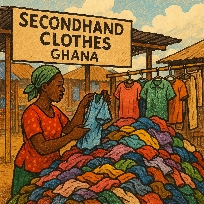The Ghana Used Clothing Dealers Association (GUCDA) has reacted to the recent call by the Global Action Against Incinerator Alliance (GAIA) Africa for the ban on unusable secondhand clothes in Africa.
ASHENEWS, on March 31, 2025, published GAIA Africa’s request for the ban, citing environmental issues as its reason.
GAIA, in a statement by its Communications Coordinator, Carissa Marnce to mark the 2025 Zero Waste Day in Lagos. had claimed that Kantamant Market in Ghana has become a hub for secondhand clothing, where approximately 15 million items are imported each year, commonly referred to as “Obroni Wawu” or “dead white man’s clothes.”
While oobserving that “These wastes fill landfills, clogs waterways, and pollute the environment, all while undermining local textile industries and sustainable economies,” GAIA called for urgent policies that would stop textile waste exportation to Africa.
ALSO READ GAIA Africa calls for ban on unusable secondhand clothes in Africa
“We demand urgent policies that stop the export of unmanageable textile waste to Africa and hold corporations accountable for the full lifecycle of their products.”
However, reacting to the call through a letter to ASHENEWS, GUCDA General Secretary, Edward Atobrah Binkley argued that”a blanket ban on secondhand clothing imports may not address the root causes of the issue and could inadvertently harm economies andlivelihoods across the continent.”
According to the association, reusing clothing through the SHC trade offers substantial environmental advantages, including, among others, emission reduction.
“The reuse of a single t-shirt can save over 3 kg of CO₂ emissions,making secondhand garments significantly less harmful than newly manufactured ones,” GUCDA posists.
Read GUCDA’s statement below:
I am writing on behalf of the Ghana Used Clothing Dealers Association (GUCDA) in response to the recent article titled “GAIA Africa Calls for Ban on Unusable Secondhand Clothes in Africa,” published on 31 March 2025.
We appreciate the attention drawn to the environmental challenges posed by textile waste in Africa. However, we believe that a blanket ban on secondhand clothing imports may not address the root causes of the issue and could inadvertently harm economies and
livelihoods across the continent.
In Ghana, the SHC sector is a significant contributor to the economy, providing employment to approximately 2.5 million individuals, including many women and youth who might otherwise face limited job opportunities.
According to a 2023 Oxford Economics study, SHC trade between Ghana and the EU and the UK contributed $35 million to Ghana’s GDP and supported 14,000 formal jobs.
Additionally, our own research shows that SHC imports generated $29.5 million in government tax revenues in 2022, surpassing the budget allocated to Ghana’s Livelihood Empowerment Against Poverty (LEAP) programme.
Reusing clothing through the SHC trade offers substantial environmental advantages:
● Resource Conservation: Reusing 600 kg of clothing can save approximately 3.6 billion litres of water, addressing the textile industry’s significant water consumption.
● Emission Reduction: The reuse of a single t-shirt can save over 3 kg of CO₂ emissions,
making secondhand garments significantly less harmful than newly manufactured ones.
● Waste Reduction: Ghana’s SHC imports in 2019 prevented 15,000 tonnes of textile waste
from new clothing production, alleviating pressure on landfills and reducing microplastic
pollution.
The environmental issues associated with textile waste in Ghana are multifaceted. While the influx of new low-quality fast fashion from Asia is a concern in Ghana and around the globe, the broader challenge lies in inadequate waste management infrastructure.
Addressing these challenges requires investment in robust waste management systems, promoting sustainable consumption patterns and addressing fast fashion at source, rather than imposing restrictions on the SHC trade which extends the lifespan of garments.
SHCs are part of the solution to building a global circular economy in textiles and reducing the damage from new clothing production, particularly fast fashion.
We acknowledge the environmental concerns raised by GAIA Africa and agree that the
overproduction of low-quality fast fashion garments is a pressing issue.
However, implementing a ban on secondhand clothing imports would have unintended negative consequences, including increased unemployment, loss of affordable clothing options, and a surge in demand for new fast
fashion imports.
We advocate for a collaborative approach that addresses the root causes of textile waste, invests in waste management infrastructure, and supports sustainable practices that benefit
both the environment and the economy.


